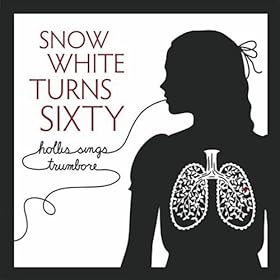Dale Trumbore & Gillian Hollis: Snow White Turns Sixty - an unbelievable look at tales from childhood
 A song cycle of poems retelling traditional fairy tales in a provocative, modern, dark, and ultimately liberating way
A song cycle of poems retelling traditional fairy tales in a provocative, modern, dark, and ultimately liberating way
Gillian Hollis and Dale Trumbore have been collaborating since they met as undergraduates at the University of Maryland, College Park. Snow White Turns Sixty was premiered as a stage production in 2010 by the Chamber Opera of USC. This isn't Disney. This isn't soft, fluffy and sanitized.The CD begins with "Joy" and a powerful punctuation on the piano. Gillian's voice then comes in with broad lyric line with a leap of a 7th, and goes up from there! The melody is wild like the opening line of the poem by Sara Teasdale "I am wild, I will sing to the trees..." Trumbore makes full use of Hollis extensive range climaxing in the end with "I can live!" But, rather than leave us hanging, the vocalist and composer give us closure as she repeats the last three words with a sense of hope and reflection.
"The Kiss" is a darker look at the difference between the hopes in that first kiss, and the reality of it.
"His kiss was not so wonderful
As all the dreams I had."
This short song captures both the hopes and the sense of pondered disappointment in the reflection post kiss.
In "November" we're treated to rich, sumptuous jazz chords as we contemplate the coming winter, and the fading of a relationship. The vocal line isn't something you'll hear Diana Krall sing, yet the angst and tender agony of a woman watching her love fade away. Hollis and Trumbore have more to say than a sultry standard could accomplish. The fourth and final song set to Teasdale's words is "Prayer" follows nicely after "November" with the hope of finding love one more time. There is steady build to the line, "Oh, let me love with all my strength" only to come back down for the final line "Careless if I am loved again." While the music gives a nice effect to the overall line of the poem, "Prayer" doesn't capture the character as well as the previous three pieces; there is neither the hope nor the pleading the words convey.
The title track "Snow White Turns Sixty" starts the middle section of the album with 12 songs by various poets. It starts with a romp reminiscent of Cole Porter or George Gershwin like jazzy piano accompaniment. But Trumbore isn's Porter or Gershwin, and Snow White isn't a young girl any more. The music take wonderful twists and turns while Hollis regales what a mature woman thinks about the world --she "doesn’t care any more about what the neighbors think." This isn't a tale of despair or disappointment, but one of realization the paths life takes. Regardless of how the story began, "You won't believe her story." Trumbore beautifully swifts between expectation and intrigue as she tells the story, honest and unbelievable.
"Where's Wolf?" is richly erotic, while avoiding being overly graphic. The music is playful, inviting while at the same time being cautiously suspicious. "Gretel" is angular and painful, capturing the struggles of addition. "Sleeping Beauty" highlights the strange jump women must feel thrust expectantly from a childhood of fun and frolic into womanhood with menstrual cycles and strange men with "teasing wheedling eyes" and a "mouth that kisses too hard." "Hazel Tells Laverne" is a return to the Gershwin like sound of early, attempting to capture something of ethnic tale. The music comes close, but vocally Hollis isn't quite there. "kinder- und hausmarchen" ends the mid section of the CD and is more like a Grimms fairytale, than the softer Disney ones we've become accustomed. The nearly lilting piano with occasional unexpected angles captures this juxtaposition perfectly, giving a sense of something familiar and yet, not quite.
The final three pieces have words by Robin Myers. "Evening" is a halting walk in a late Autumn evening, realizing how much our life has become just that sort of evening. "Union Square Station" has a sense of impending doom with a continual low tremolo on the piano. Hollis does an amazing job keeping herself on track with no assistance from the piano. Yet, together the two re-create that sense of waiting in the subway for the train of death while quietly hoping it doesn't come on time. Closing out the CD is "This Morning." Are we at an end, and if so, how do we face it? Will it be a "thirst in the lungs" or a "dense nothing of warmth across the rug?" Drawing our thoughts to reflection on what we've heard, what we've lived and what we still have left.
Trumbore's song cycle takes us on a wonderful journey, if not a comfortable one. We reflect in what Gillian Hollis sings, augmented by the music and piano of Dale Trumbore drifting like an old log in a lazy river. This is music that glances back at the once mighty oak of childhood tales and sees what they were, but also what they are to us now. While there are bumps on the road, there are in life. Trumbore doesn't cover them up, but exposes them. Even as the music fades away we know this tale has been beautiful. We may not believe her story in every detail, but it's one worth hearing.

Comments